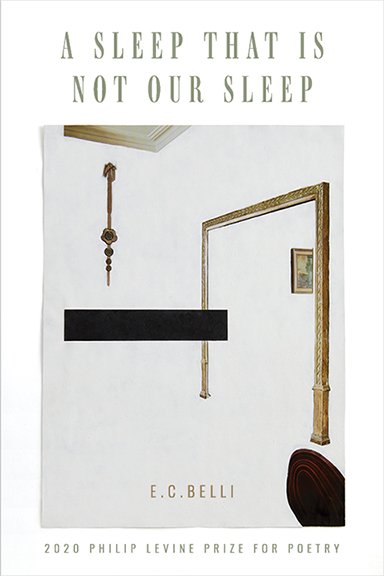
A Sleep That IS Not Our Sleep by E.C. Belli
SIGNIFIERS
There are no words left —
The last one you sent down
With a rope around its neck
It’s held at depth by stones
In the black and gray mire
It’s fine —
I say the wrong things anyway
And I’m so broken
I know only
How to break more, you say
Better to be void
Of weapons then
I’ll hand them over
Willingly, the words
Even the ones I love
Like Remembrance
I’ll give you too
My senseless name
I never liked it anyway
And the new ways I’ll speak
Yes, the new ways
Are these thin
Beautiful streaks
Like train rails crossing
The pallid skin
And rabid
With relief
I imagine
Somewhere
Somehow
Perhaps even
At a station
Ordering a coffee
Or signing up
For rewards
Some people
Not me
Are standing
Enunciating
Proudly saying
Their name
I am washing the dishes
The water as hot as it will go
I enjoy this memory
Of fire —
You step in
Placing your hands above the dish I am
Cleaning (not
Breaking)
Taking more of what’s ours to share
You switch to cold —
Fire
Is a waste
BACK COVER COMMENTS
E.C. Belli’s poems are magical. Her poems are intense lyrical distillates, capturing sorrow, or melancholy, or dreamy reverie through the alchemy of music that pulls at my heartstrings. Her poems are lullabies, lamentations, love songs, apostrophes to alter egos that praise the inclement weather of our interior moods. Whimsical, sultry and weighted with grief, A Sleep That Is Not Our Sleep is a collection of poems existing on a plane that is between waking and sleeping; it is a portrait of a beautiful and exquisitely perceptive subconscious.
— Cathy Park Hong, Judge, Philip Levine Prize for Poetry
When Sappho was asked to define beauty, she answered “Some people say it’s a herd of black horses in the grass, some people say it’s a fleet of warships leaving the harbor. I say beauty is whatever you love.” Reading E.C. Belli’s sensational A Sleep That is Not Our Sleep, I kept thinking of that bit of Sappho, thinking of Belli’s remarkable affinity for rendering with precision and acuity what is beloved, what is lovable, and what is unloved but worthy of it. One page reads, in its entirety, “little clavicle bone, you grew // things grow well in me.” The verse odes the beauty of a bone, yes, but also the beauty of a self capable of growing and sustaining what it’s made. In this collection, stones whisper in the night, eyes mend into dials. The poem “Hues” is worth the sticker price alone. To say it simply: Belli has written a singular collection, one I’ll be learning from for years.
— Kaveh Akbar, author of Pilgrim Bell

